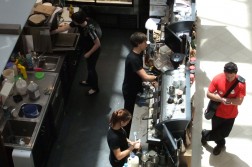What is it about the Olympics? What is it that so inspires us, elevates us to a higher level of humanity? What is it about this creation of Pierre de Coubertin, a simple Frenchman with a simple dream that someday pharmaceuticals would advance to the point where a man could outrun a giraffe?
It seems that every four years we become intoxicated, as if the Olympics were some kind of wonderful sweaty liquor, and small children everywhere find their imaginations fired with ambitions to become the next Ingvill Maakestad or Pablo Tabachnik.
I think it is because the Games represent the very pinnacle of human self-actualisation. When we look at our own flabby, pasty, nauseating bodies, we can’t help but think of what might have been, and the Olympics show that to us. They remind us that, essentially, our bodies are made up of the same elements as Usain Bolt, and the fact that they seem to be made from marshmallows and potato skins is entirely due to our own sloth and greed. Which is a comforting thought.
"I am, at the moment, incapable of rising from this couch without a system of pulleys and levers," we can think to ourselves, "but at any moment I may leap upon the treadmill and within half an hour be transformed into a lean, rippling god ready to take on the world at European handball". These are the thoughts that prevent us giving up completely, along with the fact that it’s a shorter distance to the fridge than the gun cabinet.
And so we see what a useful purpose the Olympics serve, and what good value we get for the several billion dollars spent on our Olympic program each week. Some may carp and complain and raise petty irrelevant points like hospitals and education and life-saving medicines for homeless orphans, but I would say, what price inspiration? Maybe by winning gold medals, our athletes can provide the impetus for our kids to create their own successes, if and when they grow up.
I mean, look at Michael Phelps. Could there be a better role model? He has truly shown children everywhere that if they put their minds to it, they too can be genetic freaks with a unique natural aptitude for swimming. Get working on that DNA, Phelps tells us, and don’t give up until you get there. "Anyone can do anything they set their mind to," he said, and how true that is. Admittedly, this will raise certain problems when 15 different people set their minds to winning gold in the 400 individual medley, but the indomitable human spirit will no doubt overcome once again to find an inspiring and ridiculous solution.
Phelps is truly amazing. Did you know that if Michael Phelps were a country, he would be an extremely small one? Most likely a minor central European republic, whose main export would be stamps? It’s probably pretty lucky that instead he is a swimmer, since the responsibilities of nationhood may be too much for him at this stage. It also provides our hard-working and ever-original sports journalists with the opportunity to mention, in every single article written about the man, the hypothetical consequences of Phelps being a country.
They never apply it to other athletes. Nobody ever writes about how if Craig Mottram were a country, he would be constantly being conquered by Ethiopia, or how if Tamsyn Lewis were a country nobody would ever want to go there. One suspects the whole thing is a journalistic ploy to distract people from the fact they ran out of good puns for Stephanie Rice about 10 minutes in.
Which brings us, of course, to the Australian team, and the shame they have brought on us all. Apart from notable exceptions like Rice – who is quite remarkable in her ability to combine fast swimming and skilful underpants-wearing – the Australian athletes have been, to say the least, disappointing. Our male swimmers won no gold medals, suggesting that Eamon Sullivan should have stayed with his girlfriend, and Grant Hackett should probably have left his wife.
Why is this? Why has the Australian team underperformed so, despite the massive funding, the superb training techniques, the suitcases full of tiny magical pixies providing moral support? The medals have simply dried up. Oh yes, Sally McLellan won a silver in the hurdles, and good for you Sally, but let’s not forget that second place is the first loser. Which makes bronze the second loser, and the Australian gymnastics team absolutely pathetic.
John Coates, the president of the Australian Olympic Committee, is one man who is very worried. Out of a pure sense of altruism, he has urged the government to increase Olympic funding, the situation turning even more desperate now it has become apparent that we will finish behind Britain in the medal tally, which has been shown to be one of the harbingers of the coming of Satan upon Earth.
Independent economic modelling by Deloitte has demonstrated that if Australia wins fewer gold medals than Britain, it could potentially wipe up to 40 per cent from the gross domestic product and possibly cause 40 days and 40 nights of rain. History shows that the last time Britain exceeded Australia’s medal count, Gough Whitlam was dismissed, an earthquake hit Newcastle, and Peter Brock disappeared without trace while swimming.
This is why I urge all Australians to get behind the push for more Olympic funding. In our unhealthy obsession with scientific discovery and the arts, we have neglected sport for too long. Our national pride depends on a speedy resurgence. At these Games we sent 433 athletes; for the 2012 London Games I suggest we aim for at least 1500.
If necessary, we should redeploy military divisions as support for our training programs. Retrofit hospitals as velodromes. Make fencing a compulsory subject in all primary schools. Push a resolution in the United Nations to make it illegal to rank medal tallies on any basis other than "per capita". And of course, have Tamsyn Lewis humanely put to sleep.
Nobody ever said patriotism was easy. But the road to self-esteem is, indeed, paved with gold.
Donate To New Matilda
New Matilda is a small, independent media outlet. We survive through reader contributions, and never losing a lawsuit. If you got something from this article, giving something back helps us to continue speaking truth to power. Every little bit counts.



